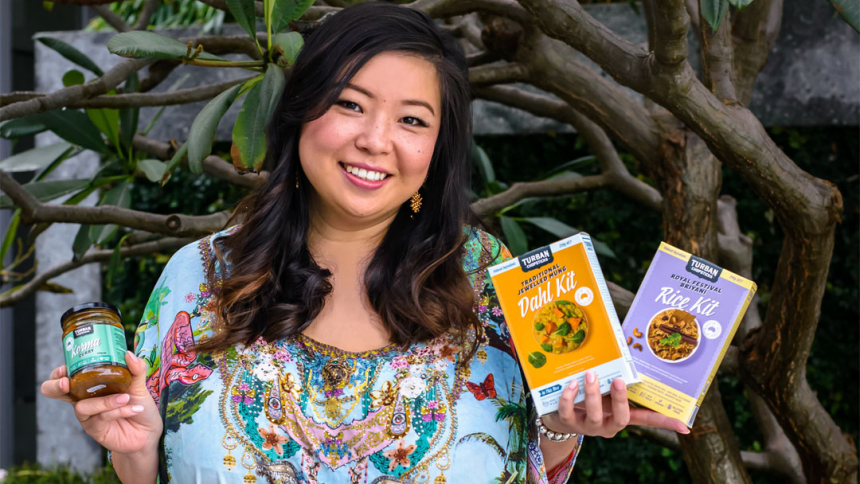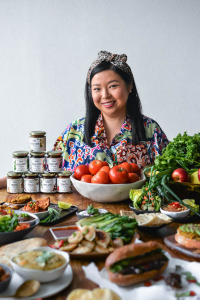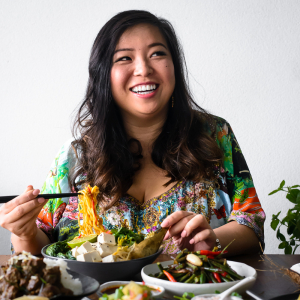
Mei Yong grew up with an unspoken language of love, one that was expressed through food.
“Food is what embodies us as a family; there’s an abundance of love with Asian communities but it’s different,” she explains. “They don’t just go up and say ‘I love you’; they speak through food: ‘what would you like to eat? I’ll make your favourite dish’. That love is shown through how they care for you.”
Mei is carrying on that language today through Turban Chopsticks, the plant-based meal kits, curry pastes, sauces and chutneys that have become a beloved staple in so many of our kitchens (though she’s quick to point out she also tells her nine year old daughter how much she loves her all the time).
Food has been a huge part of Mei’s life ever since she can remember – not just the eating, but the growing and preparation. Her dad is a chef, her uncle was a chef and her family own a chain of restaurants and factories back home in Malaysia. Growing up, her parents worked in their Northbridge restaurant from 9am to 11pm, so Mei was raised by her grandparents.

“I’m so grateful for them, they taught me cooking and life skills, how to grow your own food, all the things you need to know when you’re growing up,” she says.
Although she was always handy in the kitchen, Mei knew how hard the restaurant life could be and pursued a different career path, in human resources and industrial relations. But the pull of her childhood was strong. She was doing fly-in, fly-out with a big mining company when the seed for Turban Chopsticks was first sown.
“Every time I came home I wanted to eat soul food, the kind of food I was brought up on – the curries, the slow cooked soups, the rotis, the dahl,” she says. “I really wanted to come back to that but you’re so tired when you work 12 to 14 hours and it takes too long to make everything from scratch.”
Craving something comforting and nourishing, Mei made up little spice mixes and pre-prepared curry pastes so that when she returned home, she could cook a biryani or curry in no time. “Other people at the mine would say ‘can you give me one’ and I could see there was a gap in the market,” she says.
Mei started small, with a space in a shop her father had. “Dad wasn’t educated in the traditional sense but he was very wise. He sacrificed a lot for his family and he said ‘start small and I can help you a little bit and we’ll see what the market thinks’ – he was always very encouraging with business,” she says.
We have the most amazing customers, they know my journey, they see me work these crazy hours and they have been there the whole time – it’s those connections we made in the beginning that have stayed with us.
With this family help and her savings, Mei started making sauces batch by batch, pot by pot – Turban Chopsticks’ most popular sauces, the green curry and satay sauce, among them – and selling them at farmers markets.
“I would talk to every customer and find how what they cook and how they like their sauce, the spice, everything – that’s where my locavore mindset comes from,” she says.
Those early customers are still with her today, and Mei credits them with ensuring Turban Chopsticks won the 2023 Product of the Year, sponsored by Buy West Eat Best, at the WA Good Food Guide Awards.
“We have the most amazing customers, they know my journey, they see me work these crazy hours and they have been there the whole time – it’s those connections we made in the beginning that have stayed with us,” she says.
“The moment we won I knew it was these guys who made it happen because they are the ones who voted and got all their family and friends to do the same.
“They took a chance on me back when I was at the markets, buying a jar at $15 wasn’t cheap and they gave me a shot. I’d have no business if it wasn’t for the community embracing me.”
Turban Chopsticks has come a long way since those grassroots days at the markets. It’s now a thriving brand with more than 30 lines stocked in independent supermarkets and specialty food stores around the nation, as well as filling bulk paste and sauce orders for restaurants and other large clients. Mei is also looking at new formats, such as “cooking for one” mealkits, and pushing into the international market.

Throughout this growth, Mei’s passion for local produce has remained steadfast and continuously growing. It’s one of the reasons she’s proud to be part of Buy West Eat Best.
“They are really shining a spotlight on the producers and that’s huge because they don’t get enough acknowledgement of what they do – we need to know where our food comes from,” she says.
Turban Chopsticks sources as much as 90 percent of its ingredients from Western Australian producers, including tomatoes, onions, eggplants and the freshest herbs from the Gascoyne and avocados and apples from the Southern Forests.
Mei also works with growers to ensure good food doesn’t go to waste simply because it doesn’t look perfect. “Many buyers will dismiss blemished fruit or what they see as ugly fruit and it just goes to waste,” she says. “For me to see that – you know Grandma made everything and used everything – all those hours farmers spend growing these crops go to waste, it’s just troubling.”
The entrepreneur is also a big advocate for clean food – all the Turban Chopsticks range is free from additives and preservatives, and gluten-free. It’s a core value that Mei has carried through to parent company My PlantCo’s recent foray into other food businesses, Kado (avocado ice-cream) and Real Oats.
“We are plant based. Our whole company ethos is value add – so we take something like an avocado and we change it to a high retail consumer product that goes to the export and domestic markets,” Mei says. “Our values are to have clean food, sustainable food and work more closely with our farmers.”
She is very excited about the prospects for Real Oats, which the company has been in research and development for some time now, looking at ways to value add to what Mei describes as “the Silicon Valley of oats in the West”.
“We basically export 60 to 70 percent of our oats, so as a company we were like, let’s change this and really make oats shine with a suite of innovative products beyond the porridge breakfast oats and oat milk,” she says.
When I started I knew I wanted to create a circular business, where we used local suppliers, employed local people – especially women and those within the disability sector who are often overlooked in the workforce – and gave back to the community beyond food
Although Mei is not able to go into too much detail now, the expansion will mean a big investment in a new factory where My PlantCo – driven by its mission to support local, reduce waste and make sustainable and nourishing living accessible – will produce all the food ranges. This will also see a corresponding jump in staff, from 15 to more than 100 once the factory is up and running.
While the foodie and sustainability entrepreneur is naturally excited about the future, Mei hasn’t lost sight of her roots. As a mother, she is also driven by the desire to create something meaningful and sustainable for future generations.
“When I started I knew I wanted to create a circular business, where we used local suppliers, employed local people – especially women and those within the disability sector who are often overlooked in the workforce – and gave back to the community beyond food,” she says.
“I believe in, and am shaping, a business that focuses on a linked prosperity model, which means that as My PlantCo prospers, everyone connected to our business and all communities prosper, too – either from an economic perspective or through our sustainability innovations that contribute to a planet for tomorrow.
“It hasn’t been easy, I had to have grit, but I knew I just had to stay true to my values. As COVID showed, when everything else fails, the people who stand by you are your family, loyal customers and local community and I’ll never forget that.”